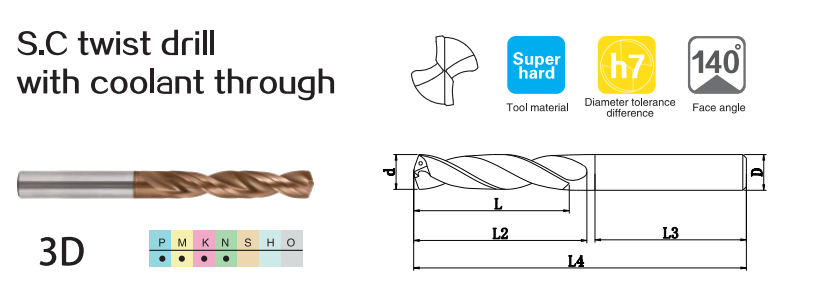Solid Carbide Drill With Internal Coolant
Features of stainless steel cutting:
Chips are not easy to break and are easy to bond: stainless steel has great plasticity and toughness. Chips are continuous during turning, which not only affects the smooth operation of the operation, but also crushes the processed surface.
When drilling stainless steel, the chips are easy to stick to the drills, that's need the coolant oil to flush out the chips from the holes.
Solid Carbide Drill With Internal Coolant,Carbide Drill Bit For Metal,Milling T Slot Cutter,Solid Carbide Drill Mill ROYI CNC TOOL TAIXING CITY CO.,LTD , https://www.royitools.com


Contraindications for the use of chlorinated fertilizers
Chlorinated fertilizers are a type of fertilizer with a large production volume and application rate. The use of such fertilizers is of great significance for agricultural production. Various crops are sensitive to chlorine. Some plants are very sensitive to chloride ions. When the amount of absorption reaches a certain level, it will obviously affect the yield and quality. These plants are usually called bogey plants. When chlorine ions are more, it is not conducive to the conversion of sugar into starch. The starch content of roots and tuber crops will decrease. Chloride ion can promote the hydrolysis of carbohydrates. Watermelon, sugar beet and grape will reduce the sugar content. Chloride ions will affect tobacco. Combustibility, cigarettes are easy to extinguish; when chlorine ions are too much, they often cause damage to seedlings of sensitive crops. Tobacco, potato, sweet potato, sugar cane, watermelon, grape, citrus, beet, apple, tea, cabbage, pepper, lettuce, leek, etc. are all chlorine-free crops. Chlorine has an adverse effect on the Solanaceae crop. Soybean and green beans have weaker chlorine resistance.
Chlorine-sensitive crops such as tobacco, sweet potato, potato, Chinese cabbage, pepper, lettuce, leeks, apples, grapes, tea, watermelon, etc., often affect the product when applying chlorinated fertilizers such as ammonium chloride and potassium chloride. quality. For example, too much chlorine will reduce the flammability and bad smell of tobacco, the starch content of potato crops will decrease, the quality will be poor, the sugar content of fruit will be lowered, and the acidity will be high, which will make the fruit flavor unsatisfactory. Therefore, chlorine-sensitive crops should choose to contain sulfur fertilizer when selecting fertilizers.
Conversely, chlorine-insensitive crops such as rice, sorghum, millet, cotton, corn, wheat, peanuts, soybeans, tomatoes, etc., when applied with chlorinated fertilizers, can not only save on the cost of fertilizers, but also on the effects of certain crops. Better. For example, cotton, hemp and other fiber crops, the application of potassium chloride is conducive to increase its fiber length and toughness; the application of chloride-containing fertilizer in rice fields is often better than sulfur-containing fertilizers, because it can reduce the damage of hydrogen sulfide to rice roots.
Total 1 | <First <Prev 1 Next> Last> |
share to: